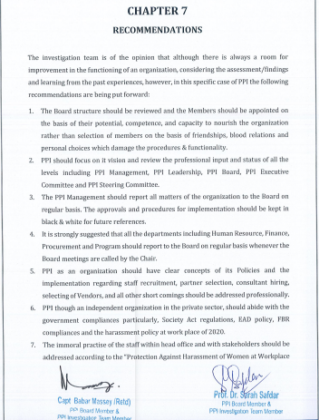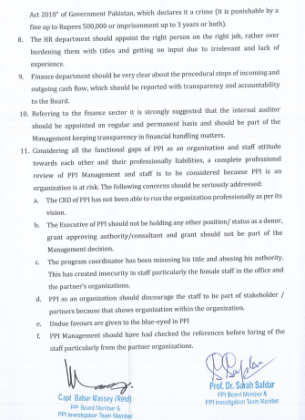A group of like-minded leaders aided by international donor agencies embarked on a mission in 2017 to unite, equip and strengthen the Pakistani Christian community by encouraging various groups, including the church, faith-based institutions, and non-government organisations (NGOs), to draw together, and through collaboration and networking, transform their communities.
However, their brainchild, Pakistan Partnership Initiative (PPI), did little to address the challenges facing the community and ended up being consumed by the very menaces affecting the global image of the church in Pakistan, a Kross Konnection investigation has revealed.
PPI began its formal operations in 2019, with an aim to catalyse a movement within Pakistan to achieve the abovementioned mission. However, soon after PPI’s inception, a key stakeholder raised concerns regarding issues of misgovernance, nepotism, conflict of interest, lack of transparency and accountability, etc in the organisation and demanded an inquiry.
In Sept 2021, the Board of Governors of PPI headed by Church of Pakistan’s Bishop of Peshawar Diocese Humphrey Sarfaraz unanimously agreed to form an investigation committee comprising three board members – Professor Dr Sarah Safdar, Captain (Retd) Babar Massey and Aster Saleem – to probe the charges, along with an independent forensic audit of the organisation.
The committee initiated its investigation in December 2021 and finalised its report on Feb 16, 2022. However, in a strange twist of events, the PPI board not only termed the report by its own constituted committee as “biased” but its general body also “disowned” it without elaborating the reasons in writing.
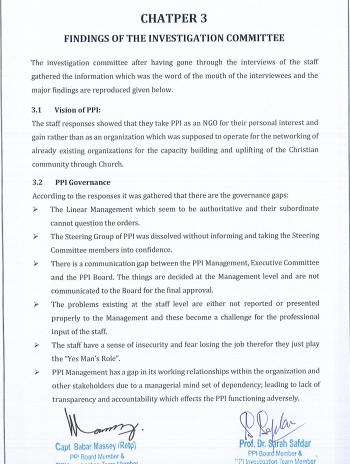
The detailed report points to critical issues of nepotism, misgovernance, conflict of interest, etc in the affairs of PPI, including a deviation of the management from the original vision of the organisation.
“Staff responses show that they take PPI as an NGO for personal interest and gain rather than as an organisation which was supposed to operate for the networking of existing faith-based organisations for capacity-building and uplift of the Christian community through the Church,” the report notes, referring to interviews with PPI staffers.
“The PPI leadership was reluctant to allow a transparent investigation from the start.”
It also alleges resistance from the PPI management in carrying out a transparent probe, including registration of a police complaint and institution of legal notices against one of the investigation team members, Capt (r) Babar Massey.
KEY FINDINGS
The investigating report expresses “serious concern” over the structural setup of PPI and questions the roles of specific people in all relevant committees, thus influencing decisions of the management in awarding grants to “favourite” organisations.
“A good example of conflict of interest at governance level would be Mr Sebastian Justin who is holding several portfolios; General Secretary of PPI Board, Member of Executive Committee, Member of Grant Approving Committee of PPI, head of PPI’s Business Program for two years, member of International Working Committee, referring consultants to management, Pakistan representative of Kirk in Actie (a Netherlands-based Christian INGO) which is also a PPI donor, KIA is also the funding directly to PPI partner organisations REEDS, AWARD and NOAD before PPI took them in partnership,” the report states.
Kross Konnection contacted Justin for his response but he declined to comment on the contents of the report, citing restrictions from KIA. However, responding to a question on allegations of conflict of interest, the board member said his role in PPI was in knowledge of his INGO and matters related to grants for PPI were dealt by his line manager.
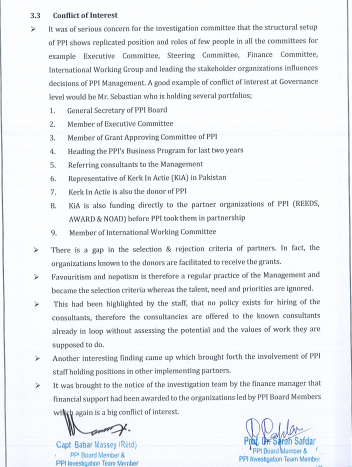
The report also states that financial support was given to organisations led by PPI board members. Moreover, there was no policy for hiring consultants and projects were handed to people already in the loop without assessing their potential for the job, it notes.
“A sum of over Rs18 million has been paid to different consultants in a period of less than two years without any approval process,” it states. The list of individuals hired as advisers includes individuals such as steering committee member Waheed Yousaf, Sajid Gulzar, Shahzad Bhatti, and Adeel Rehmat.
The investigation into the PPI affairs was initiated on the complaint of Adeel Rehmat, the executive director of Pak Mission Society and one of the founding members of PPI. The committee’s report reveals that Rehmat was not only paid as an adviser but the business wing of his PMS – Pak Enterprises for Sustainable Development – and other subsidiary departments also provided services to PPI.
“PPI leadership continues to deny that these issues exist in the organisation.”
Similarly, the report cited the selection of an organisation, OATH, as another example of nepotism and conflict of interest. It states that OATH was selected as a partner organisation without due diligence and on the verbal instructions of PPI’s Senior Programme Manager Titus Prince. It adds that OATH was also engaged in the development of a Church Engagement Strategy on the recommendation of Sebastian Justin even though it did not have any requisite experience.
“It was further revealed that PPI’s Capacity Building Manager Asher Shahzad is the founder and chairman of OATH, PPI Communication and Coordination Manager Neeraj Siddique is a registered board member of OATH, Shahzad Bhatti (vendor of PPI) is a board member of OATH, Shahzad Bhatti’s wife is also a board member of OATH, Zorin Elizabeth, being paid in capacity of a consultant is executive director and treasurer of OATH board and is also paid as CEO of OATH in partnership,” the report states.
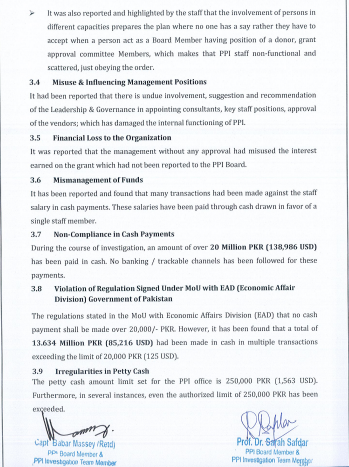
“Based on the above critical factors, it may be narrated as an NGO of PPI senior management team supported through PPI grants,” it observed.
The report also highlighted the absence of a Pension Fund Policy and referred to the withdrawal of Rs2.783 million from this head by the employees over a period of 17 months. It also raised several questions on the absence of compliances and procedures related to tax payments and cash withdrawals among other financial control issues.
BOARD MEMBERS RESIGN
The committee also narrated the challenges it faced in the completion of the inquiry, including alleged delay tactics and resistance by the PPI management, lack of access to partner organisations and noncooperation in the provision of financial data.
“The PPI leadership was reluctant to allow a transparent investigation from the start. During the staff interviews, PPI employee Asher Shahzad accused me of intimidating him and created a scene despite the fact that we were only asking him about his role in the organisation. Then in an obvious attempt to scuttle the probe, Shahzad lodged a complaint against me with the police. I believe this was done with the consent of PPI’s CEO Ashraf Mall,” investigation committee member Capt (r) Massey told Kross Konnection.
Massey said he and Dr Sarah had resigned from their positions after submitting the investigation report to the board “because the chairman and other members showed no interest in addressing the issues”.
“I was a member of the PPI board since 2018, but I came across some of the worst harassment, persecution and underhanded tactics at the hands of PPI management that I have ever seen. I was targeted in a personal capacity, with my name maligned and my character assassinated, because I did come across plenty of questionable issues, which no one wanted to be probed. I was subjected to police station visits, absolutely baseless legal notices and claims, and general bullying, which left my wife traumatized and myself aghast at how low people can stoop,” Massey wrote in his resignation letter addressed to the board’s chairman on May 10.
In her resignation letter, Dr Sarah, a Christian academic who is also a member of the National Commission for Minorities and sits on several boards, stated that the investigation committee did not get support and cooperation from the management.
“The report presented half the picture and made it seem like a lot of bad practices are taking place in PPI.”
“All the three investigation team members being board members did not get support and cooperation from the management rather non-acceptable behavior and unethical attitude was seen during interviews which brought disgrace to the board members who have a status and good repute in the Christian community and society at large.”
“The recommendations of the investigation report seem to be ignored for implementation by the management, rather it is said that it is a bias [sic] report. This statement is completely incorrect and it is a blame on the investigation team members who worked on volunteer basis in their best capacity for the interest of PPI.”
Referring to the statement of minutes of a board meeting held on March 16, Dr Sarah questioned why the observations and reservations of the members regarding the impressions, scope and process of the investigation were not mentioned in the minutes.
She also questioned the status of existing board members, stating, “As a member of the investigation team I found that PPI as an organisation formed in 2019 is not registered, rather it is using the registration of Consultant Group of Development Corporation (CGDC) which was registered in 2011 under the Societies Act 1860, under registration number 6426. The status of the existing PPI board members becomes questionable because in papers the CGDC registration the names are of CGDC board members and not of the existing PPI board members.”
‘PPI WAS NOT MEANT TO BE WHAT IT HAS BECOME’
The issues in PPI were raised with all local and international partners as soon as we realised that PPI was not doing what it was supposed to do – being a networking platform that brings organisations together rather than a fundraising outfit catering to a select few only, says Adeel Rehmat.
“Issues such as misgovernance, conflict of interest, nepotism, misuse of power and sowing discord in churches and other faith-based institutions instead of bridging the gaps were among a host of issues that prompted me to part ways with the organisation that I so dearly hoped would make a difference for our people,” he said.
Rehmat says his concerns were vindicated by the investigation report but the board’s refusal to accept the recommendations and allow the incumbent management to continue in their roles had raised several questions for PPI’s international and local partners.
“PPI leadership continues to deny that these issues exist in the organisation. Though the board’s chairman and other partners acknowledge the incapability of Ashraf Mall to lead PPI, yet they have not held him accountable,” he said, adding that the reasons stated in the resignations of the two board members had left no moral and ethical grounds for Mall to continue to steer PPI.
Denying that there was a “tug of war” in the PPI as observed in the audit report, Rehmat said PPI’s vision transitioned and emerged from PMS “for great sense of purpose and mission”.
“When I blew the whistle, it was considered a tug of war as it usually happens in our culture and country. But different reports and evidence prove that PMS wanted to organise PPI instead of becoming a part of conventional leadership style and group,” he said.
Referring to issues of conflict of interest concerning him and his organisation, the PMS founder said he was never a board member of PPI.
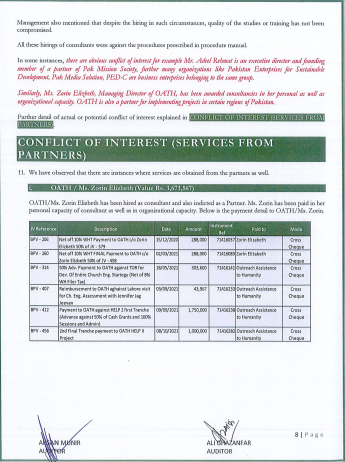
“PPI emerged from PMS in the beginning and I was paid as a consultant for the time I had agreed to give to PPI to work for the greater vision. This was duly declared to the PMS board and all stakeholders. At the same time, we were strategic partners in PPI’s CATCH and capacity-building programmes as PMS had a strong footing in these areas,” he said, adding that he refused to work as a consultant and PMS withdrew from PPI projects so that the issue of conflict of address could be effectively addressed.
Commenting on the rejection of the report, Rehmat questioned that after Capt (r) Massey and Dr Sarah’s departure, the board comprised Chairman Humphrey Sarfaraz, Vice Chairman Rev Ashaknaz, General Secretary Sebastian Justin, Treasurer Aster Saleem and CEO Ashraf Mall.
“So, practically those accused of mismanagement, nepotism and conflict of interest decided to reject the report because it exposed their own wrongdoings. Moreover, some general body members are people who are very close to the PPI management and benefit from its grants so getting a decision to ‘disown’ the report isn’t really a big deal for them,” he said.
“PPI gets its accounts audited from one of the top five international firms. It has proper policies and SOPs that it implements across its structures and operations.”
According to Rehmat, his biggest concern regarding PPI is that it was misleading the international community by projecting itself as a representative of the Pakistani church in the name of unity, collaborative vision, and advocacy.
“I urge all stakeholders to make sincere efforts for reconciliation between the partner organisations and ensure implementation of the recommendations made by the investigating committee so that PPI works according to its envisioned objective,” he added.
‘ALL’S WELL IN PPI’
Denying claims that PPI had deviated from its vision, PPI’s CEO Ashraf Mall says the organisation has been active for a very short period of time and the results of its capacity-building work are visible.
“Many church organisations and churches have developed/strengthened their systems, policies and governance and have improved their overall delivery. They have become much more accountable and transparent,” he said.
He downplayed the investigation report, saying it “presented half the picture and made it seem like a lot of bad practices are taking place in PPI”.
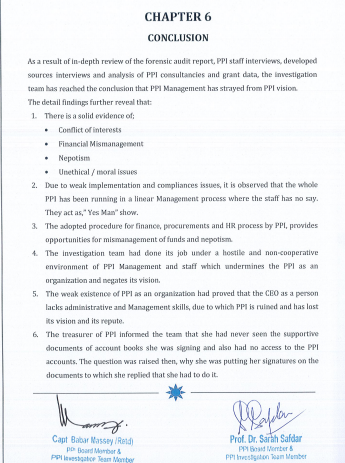
“PPI gets its accounts audited from one of the top five international firms. It has proper policies and SOPs that it implements across its structures and operations. A conflict-of-interest policy exists and declarations are signed by each stakeholder. The report has highlighted procedural gaps and we have addressed these on a priority basis,” Mall claimed.
He, however, did not elaborate on the measures taken to this effect.
The PPI chief said the independent auditors did not find any financial misappropriation or evidence of kickbacks in the organisation’s accounts.
“In terms of a ‘tug of war’ mentioned in the auditors’ report, there is no tug of war between senior management, board members or existing partners. Sometimes there is a difference of opinion but that does not mean there is a tug of war. Categorically, the annual audit reports, existing policies, procedures, organisational culture and the credibility gained at national and international levels speaks for itself regarding the level of quality and accountability maintained by the organisation,” said Mall.
The CEO denied that any board member or their organisations gained financial benefits from PPI. He also denied the investigating team’s charge of hindering the probe.
“We provided access to all our documents, the auditor spent 20 days sifting through them. The board instructed the inquiry committee that no document will be taken out of the office. Even then we cooperated and provided soft copies of some documents that they requested,” he said, adding that the board’s chairman stopped the investigation when the “committee crossed the limit”.
“The board accepted the report in its meeting on March 31 with observations and reservations and agreed that the management fix the procedural issues for the betterment of PPI. However, the General Body in its meeting on June 13 decided to disown the report but as we had already worked on the findings, they allowed us to continue with that work,” he said.
According to Mall, the two board members had resigned of their free will while one board member, Aster Saleem, withdrew from the inquiry committee “due to reservations on the process and breach of confidentiality”.
“In terms of legal notice or police inquiry, the staff did this in their personal capacity as they faced harassment and insult. The matter was resolved,” he claimed.
Responding to a question on whether a transparent inquiry was possible while the management was sitting at the helm of affairs, Mall said that if the board decided that the top management should step aside, it would have been done.
“If we consider the table analogy, we are not meant to stay at the table, but to build a bigger table and bring more people to it with us.”
The board’s chairman, Bishop Humphrey, said the board members had rejected the report because the committee had deviated from the Terms of Reference (TORs) of the investigation.
“The inquiry members were deemed to be insensitive towards female employees during the interviews. They also included some outsiders in the interview process without due permission,” he said and added that the investigation process was also “unduly prolonged”.
According to Bishop Humphrey, the actionable issues highlighted in the report have been addressed “since they mostly related to staff and organisational discipline”.
‘WE NEED TO BUILD A BIGGER TABLE’
Church of Pakistan’s President Bishop Dr Azad Marshall says he’s concerned about the PPI situation and has offered to play his role in reconciliation between the stakeholders in the larger interest of the church and community.
“One of the best ways to cultivate unity is to get on mission together and I believe this was the PPI’s founding vision. If we consider the table analogy, we are not meant to stay at the table, but to build a bigger table and bring more people to it with us. All stakeholders should work together and have a unity of heart and purpose if we really want to play a role in strengthening the church in Pakistan,” the senior church leader said.
Studies show that religion has historically been a major source of inspiration for many of those involved in welfare activities across South Asia.
Historically, non-profit activities have mainly revolved around religious mission and services, education and community welfare. While both the state and society have been active players in this regard, there is no comprehensive data available on the nature and scale of faith-based activities in Pakistan.
It is also difficult to extract information about the exact number of faith-based organisations in operation and their specific activities due to the fact that they are registered with the same offices as other non-profit organisations.
This makes it impossible to distinguish between the records of faith-based and other ‘secular’ organisations.

